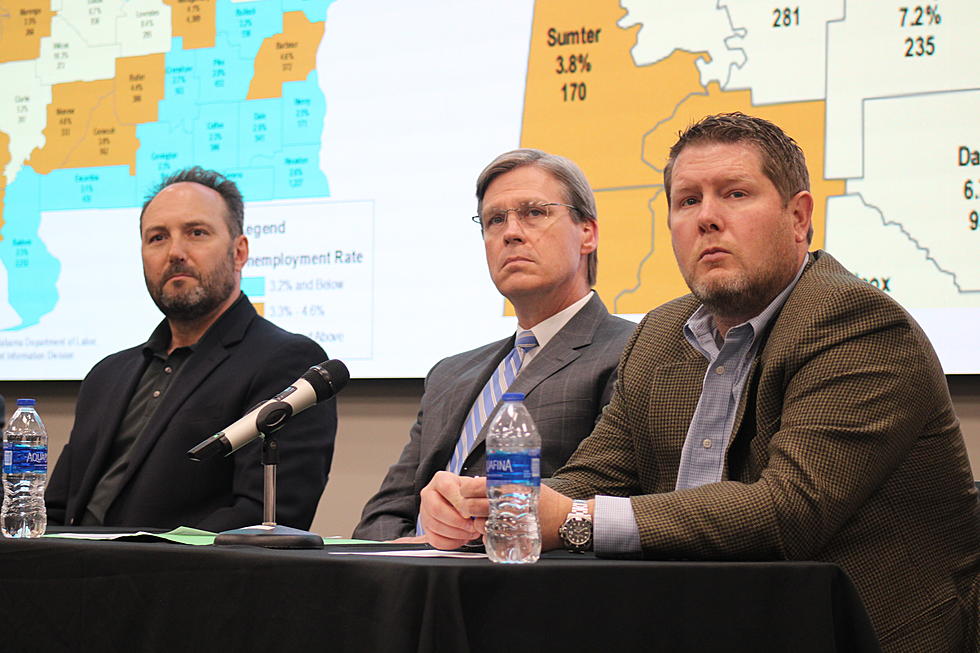
Barriers Must Come Down to Fill New and Expected Jobs, West Alabama Leaders Say
Leaders in West Alabama need to be taking proactive steps to dismantle barriers to entering the workforce to avoid a pending employment crisis, a panel of experts said Wednesday afternoon.
The conversation was the fourth event in the Chamber of Commerce of West Alabama's Next Level Series — seven different public forums that seek to examine all aspects of life in the Tuscaloosa area through discussions with top leaders from the public, private and non-profit sectors.
Wednesday's session was about the three biggest barriers keeping people who are willing and able to work from doing so -- access to childcare, transportation and housing.
The discussion was moderated by Donny Jones, the Chamber's Chief Operating Officer and the head of West AlabamaWorks, an organization that seeks to develop the workforce and match job seekers with employers in a nine-county region.
"We know that we have got to create a community where nobody falls through the cracks," Jones said. "Where nobody has a barrier that they cannot overcome, and we've all got to do that together.

The purpose of the series has always been listening and learning, not debate or solving problems -- those steps will come next month during the Chamber's Next Level Summit, a two-day retreat in Birmingham to help develop their next five-year plan.
That has perhaps never been more clear than during Wednesday's session when a panel of experts talked about three titanic issues with no straightforward solution in sight.
Alison Hooper, an assistant professor at the University of Alabama who specializes in childhood education, said childcare for working parents is limited and expensive, and even excellent facilities in the region may not fully meet the needs of parents in the area. Daycares may close at 2:30 or 3:00, which does not fully cover a traditional 9 to 5 shift and does nothing for night-shift workers in West Alabama's large manufacturing sector. While solutions in Tuscaloosa County and rural areas like Greene County may vary wildly, there are still countless people kept out of the workforce because of a lack of available and affordable childcare.
Steven Jones, a transportation engineering expert at UA, said the state and region is overly reliant on personally owned automobiles instead of pairing that with public transportation options and other ride-sharing alternatives for a modern workforce.
"To me, the single biggest barrier is the dependency on the automobile," Jones said. "Any sort of engineering system, you want redundancies, you want options and you want alternatives, and we have a system right now that is so overly lopsided that is clearly not serving us as we need."
Jones said the cost of buying, maintaining, insuring and fueling a vehicle is just too high for some potential workers, but they can't just ride a bicycle from Demopolis to Mercedes Benz U.S. International in Vance every day.
Perhaps the bleakest reports came from Mark Sullivan, Executive Vice President at Bryant Bank and Brock Corder, the President of the Builders Group in Tuscaloosa. Both discussed the challenges of creating enough affordable housing to sustain a workforce that must grow quickly to keep up with expected short- and long-term job growth in the area.
Corder said the median cost of a home in Tuscaloosa has risen by more than $60,000 in the last two years, settling in at $408,000 -- a cost that is obviously prohibitive to a large majority of workers in the area.
Sullivan said more than 2,000 jobs are expected to be created in the area in the next two years, but only around 400 homes were listed for sale in Tuscaloosa this week. Exacerbating the issue, Corder said, are dated zoning laws that severely limit what developers are legally able to do on property in Tuscaloosa, Northport and elsewhere.
Jones insisted that having and addressing these problems is better than the alternative -- that a community with more jobs than people to fill them is far better than one with more people than available jobs.
Still, the demand for workers in the area is only expected to keep growing, and leaders across West Alabama have to take steps now to develop and support that workforce.
The Next Level Series will take next Wednesday off as many in the area travel for Spring Break, then return the following week, March 23rd, for a discussion about economic diversification.
For more coverage of the Series and Summit, stay connected to the Tuscaloosa Thread.
Top Stories from the Tuscaloosa Thread (2/28 - 3/6)
More From Tuscaloosa Thread









